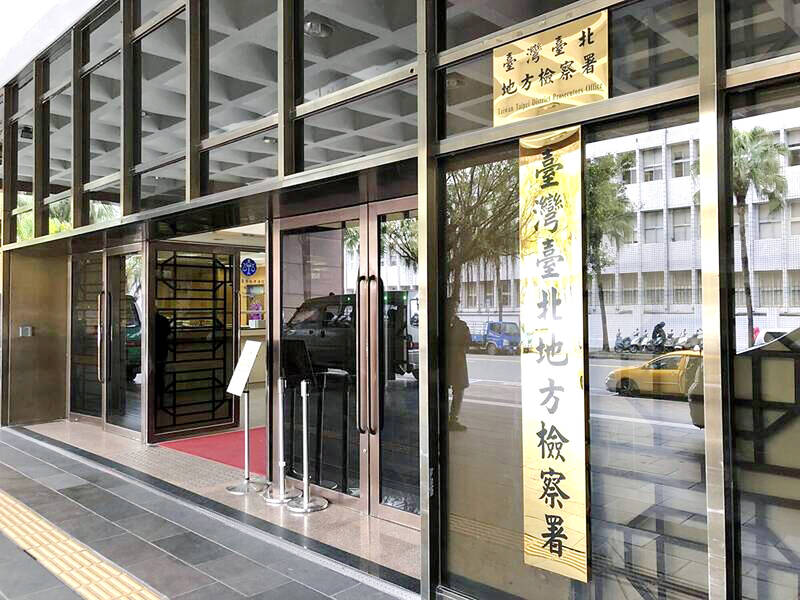Two Taiwanese were given three years deferred prosecution for their roles in helping two leading Chinese tech companies operate illegally in the country, the Taipei District Prosecutors’ Office said.
The two men, surnamed Doong (董) and Chang (張), had admitted wrongdoing and were handed deferred prosecution as part of their settlements reached with prosecutors, a court document issued on Tuesday showed.
As part of the agreements, Doong and Chang were handed penalties of NT$500,000 (US$16,124) and NT$300,000, while the two companies Doong had established in Taiwan — CXMOS and Tenafe Taiwan Technology Ltd — were ordered to make payments of NT$500,000 and NT$300,000 into the national coffers.

Photo: Taipei Times
Doong worked as an assistant manager at Wuhan-based Yangtze Memory Technologies Co (YMTC, 長江存儲) — a Chinese semiconductor integrated device manufacturer specializing in flash memory chips — from 2016 to 2019, the prosecutors said.
In November 2017, under that company’s instruction, Doong set up CXMOS in Taiwan, imported chip samples from YMTC and interviewed people in Taiwan for sales positions, in a bid to explore business opportunities in the nation, prosecutors said.
Doong was also accused of establishing and running Tenafe Taiwan Technology Ltd in May 2019, a subsidiary of Tenafe Beijing, which shipped semiconductor components, printed circuit boards and chips from its headquarters to be used as samples and for testing, as a way to boost the Beijing company’s sales in Taiwan.
Chang took over Doong’s position at Tenafe Taiwan in June 2021 and interviewed more than 30 engineers, prosecutors said.
It was found that about NT$500 million from YMTC and Tenafe Beijing had been indirectly channeled into CXMOS and Tenafe Taiwan’s bank accounts to boost funds available to them, the prosecutors said.
They said they believed Doong and Chang’s actions had breached Article 40-1 of the Act Governing Relations Between the People of the Taiwan Area and the Mainland Area (臺灣地區與大陸地區人民關係條例).
The clause says that an enterprise from China or an enterprise it invested in a third area cannot “engage in any business activities in Taiwan” unless it is “permitted by the competent authorities and has established in the Taiwan Area a branch or liaison office.”
The penalty cited for violating Article 40-1 is up to three years in prison and/or a fine of up to NT$15 million.

Taiwanese can file complaints with the Tourism Administration to report travel agencies if their activities caused termination of a person’s citizenship, Mainland Affairs Council Minister Chiu Chui-cheng (邱垂正) said yesterday, after a podcaster highlighted a case in which a person’s citizenship was canceled for receiving a single-use Chinese passport to enter Russia. The council is aware of incidents in which people who signed up through Chinese travel agencies for tours of Russia were told they could obtain Russian visas and fast-track border clearance, Chiu told reporters on the sidelines of an event in Taipei. However, the travel agencies actually applied

Japanese footwear brand Onitsuka Tiger today issued a public apology and said it has suspended an employee amid allegations that the staff member discriminated against a Vietnamese customer at its Taipei 101 store. Posting on the social media platform Threads yesterday, a user said that an employee at the store said that “those shoes are very expensive” when her friend, who is a migrant worker from Vietnam, asked for assistance. The employee then ignored her until she asked again, to which she replied: "We don't have a size 37." The post had amassed nearly 26,000 likes and 916 comments as of this

New measures aimed at making Taiwan more attractive to foreign professionals came into effect this month, the National Development Council said yesterday. Among the changes, international students at Taiwanese universities would be able to work in Taiwan without a work permit in the two years after they graduate, explainer materials provided by the council said. In addition, foreign nationals who graduated from one of the world’s top 200 universities within the past five years can also apply for a two-year open work permit. Previously, those graduates would have needed to apply for a work permit using point-based criteria or have a Taiwanese company

The Shilin District Prosecutors’ Office yesterday indicted two Taiwanese and issued a wanted notice for Pete Liu (劉作虎), founder of Shenzhen-based smartphone manufacturer OnePlus Technology Co (萬普拉斯科技), for allegedly contravening the Act Governing Relations Between the People of the Taiwan Area and the Mainland Area (臺灣地區與大陸地區人民關係條例) by poaching 70 engineers in Taiwan. Liu allegedly traveled to Taiwan at the end of 2014 and met with a Taiwanese man surnamed Lin (林) to discuss establishing a mobile software research and development (R&D) team in Taiwan, prosecutors said. Without approval from the government, Lin, following Liu’s instructions, recruited more than 70 software